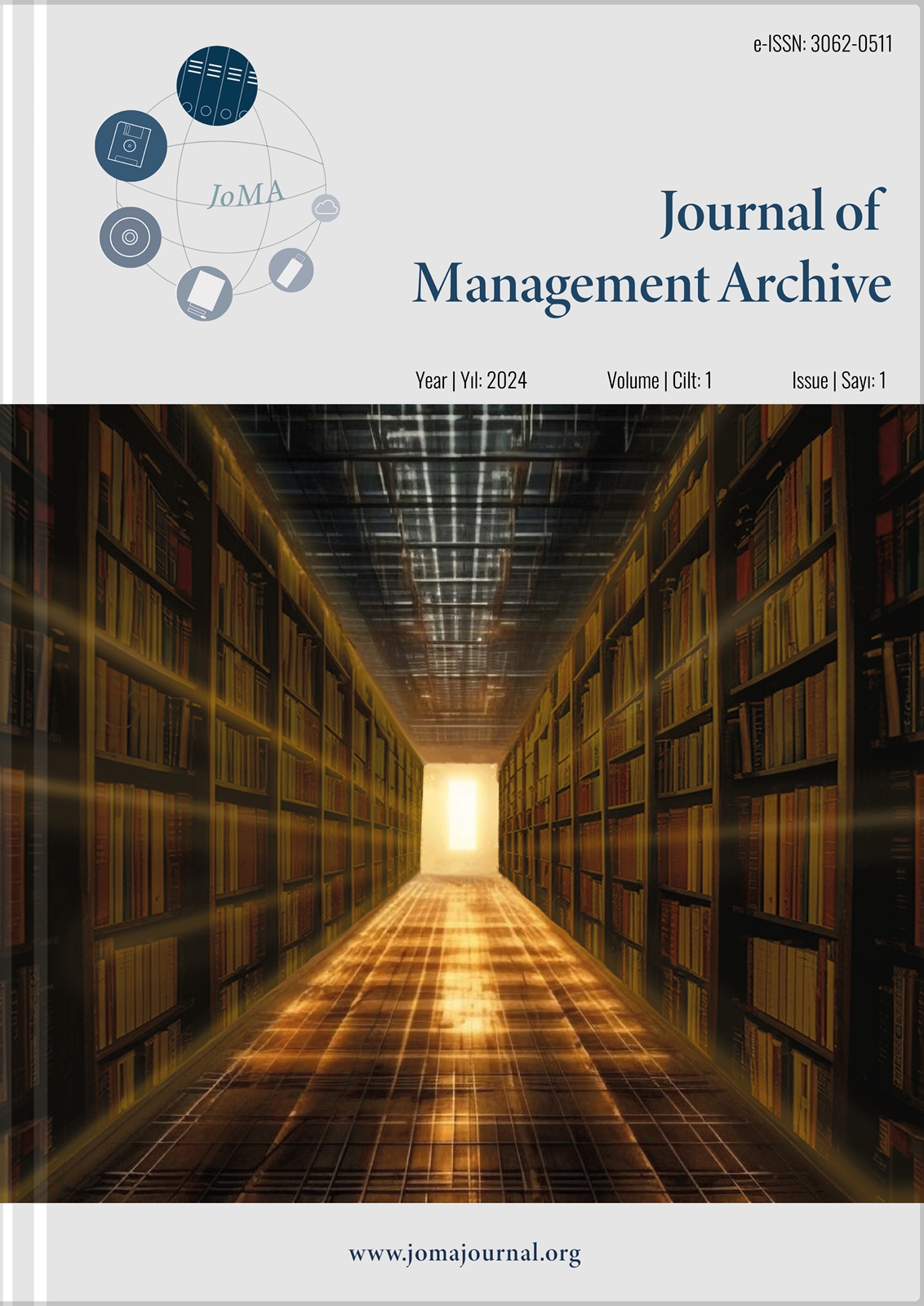Is conformist behavior related to boreout?
Main Article Content
Abstract
Background. The main reason for conducting such a study is to find the answer to the question of whether the boredom they experience at work is behind these behaviors in business life, where individuals push themselves into the background rather than using their right to speak. In this context, understanding the concept of conformism, which is new in the literature, and analyzing its relationships with relevant variables will contribute to the literature.
Aim. The aim of this study is to investigate whether conformist behaviors that individuals frequently encounter and are exposed to in business life are related to boreout experienced for some reasons.
Method. In this context, through a relational model designed according to the quantitative research method, the research data obtained from the teachers' sample (n = 325) were subjected to statistical analyses and the findings were reported.
Findings. The independent variable boreout and its all-sub-dimensions have a significant and positive contribution to explaining conformist behaviors. 60% of the variance in conformist behaviors can be explained by boredom/boreout at work. Individuals exhibit more conformist behavior by questioning their work, development and meaning due to the boredom they experience.
Conclusion. The increase in boreout level of employees, which arises for some reasons in the work environment, will be effective in employees' ability to express their opinions, express their thoughts, and decrease their participation in decisions, in other words, to increase their conformist behaviors. Because individuals want to be comfortable in the work environment where they spend most of their days and not to encounter factors that will cause boredom in order to be able to express themselves and put forward an idea on a subject.
Article Details

This work is licensed under a Creative Commons Attribution 4.0 International License.
- Abstract 521
- PDF 192
References
Başar, U. (2022). Bilinçli farkındalık (trait mindfulness) ve iş yerinde bezginlik (boreout) arasındaki ilişki üzerine kesitsel bir araştırma. 30. Ulusal Yönetim ve Organizasyon Kongresi Bildiriler Kitabı (pp. 275-284.). Süleyman Demirel Üniversitesi.
Bearden, W. O., Netemeyer, R. G., & Teel, J. E. (1989). Measurement of consumer susceptibility to interpersonal influence. Journal of Consumer Research, 15(4), 473. https://doi.org/10.1086/209186 DOI: https://doi.org/10.1086/209186
Cialdini, R. B., & Goldstein, N. J. (2004). Social influence: compliance and conformity. Annual Review of Psychology, 55(1), 591–621. https://doi.org/10.1146/annurev.psych.55.090902.142015 DOI: https://doi.org/10.1146/annurev.psych.55.090902.142015
Cürten, S. (2013). Boreout-Syndrom und Coaching. Organisationsberatung Supervision Coaching, 20(4), 473–478. https://doi.org/10.1007/s11613-013-0347-8 DOI: https://doi.org/10.1007/s11613-013-0347-8
Demir, Ö., Yalım, Ç., & Narlıkaya, Z. (2020). İşyerinde can sıkıntısı ve çözüm önerileri üzerine teorik bir çalışma. Fırat Üniversitesi Uluslararası İktisadi ve İdari Bilimler Dergisi, 4(2), 167-200.
Deutsch, M., & Gerard, H. B. (1955). A study of normative and informational social influences upon individual judgment. Journal of Abnormal & Social Psychology, 51(3), 629-636. https://doi.org/10.1037/h0046408 DOI: https://doi.org/10.1037/h0046408
Gino, F. (2023, August 4). Let your workers rebel. Harvard Business Review. https://hbr.org/2016/10/let-your-workers-rebel
Gökçen Kapusuz, A. (2023). Konformizm (uymacı davranış): Bir ölçek geliştirme çalışması. Hitit Sosyal Bilimler Dergisi, 16(1), 57-73. https://doi.org/10.17218/hititsbd.1215661 DOI: https://doi.org/10.17218/hititsbd.1215661
Güngör İlerler, T., & Altın Gülova, A. (2020). Örgütsel kurallar ve normlara uyma davranışına örgüt kültürü bağlamında kavramsal bir bakış. Izmir Democracy University Social Sciences Journal, 3(2), 104-129.
Hair, J. F., Black, W. C., Babin, B. J. & Anderson, R. E. (2010). Multivariate Data Analysis (7th Ed.). Pearson Education.
Kara, F. M., Sarol, H., Gürbüz, B., & Gürkan, R. K. (2023). Boreout at the Office: The role of leisure boredom in predicting job burnout and social media addiction. Journal of Education and Recreation Patterns, 4(2). https://doi.org/10.53016/jerp.v4i2.178 DOI: https://doi.org/10.53016/jerp.v4i2.178
Konak, S., & Kiliç, Ö. (2023). The relationship between career adaptability and perceived job stress in hotel businesses: The Mediating effect of Boreout syndrome. Journal of Hospitality and Tourism Issues, 5(2), 105-118. https://doi.org/10.51525/johti.1389080 DOI: https://doi.org/10.51525/johti.1389080
Kalaycı, Ş. (2010). SPSS uygulamalı çok değişkenli istatistik teknikleri. (5. Baskı). Asil yayınevi.
Merdan, E., Erdem, A. T., & Gümüşsoy, Y. (2022). Boreout sendromunun üretkenlik karşıtı iş davranışı üzerine etkisinde sanal kaytarmanın aracılık rolü. Business and Management Studies an International Journal, 10(1), 176–191. https://doi.org/10.15295/bmij.v10i1.1983 DOI: https://doi.org/10.15295/bmij.v10i1.1983
Moris, H., & Nedosugova, A. B. (2019). Coaching as instrument to identity and remedy for boreout syndrome with employees. 2nd International Conference on Education Science and Social Development (pp. 138-141). Atlantis Press. DOI: https://doi.org/10.2991/essd-19.2019.30
Mutlu Bozkurt, T. M., Tekkurşun Demir, G., & Cicioğlu, H. İ. (2019). Spor lisesi öğrencilerinin boyun eğici davranış düzeyleri. Gazi Beden Eğitimi ve Spor Bilimleri Dergisi, 24(2), 89-99.
Özsungur, F. (2020a). The effects of boreout on stress, depression, and anxiety in the workplace. Business & Management Studies: An International Journal, 8(2), 1391-1423. https://doi.org/10.15295/bmij.v8i2.1460 DOI: https://doi.org/10.15295/bmij.v8i2.1460
Özsungur, F. (2020b). The mediating role of boreout in the effects of mobbing on service innovation performance. Asia Pacific Journal of Innovation and Entrepreneurship, 14(2), 203-213. https://doi.org/10.1108/apjie-12-2019-0085 DOI: https://doi.org/10.1108/APJIE-12-2019-0085
Rothlin, P., & Werder, P. (2008). Boreout! Overcoming workplace demotivation. Kogan Page.
Saldana, J. (2013). Power and conformity in today’s schools. International Journal of Humanities and Social Science, 3(1), 228-232.
Stock, R. M. (2014). Is Boreout a threat to frontline employees’ innovative work behavior? Journal of Product Innovation Management, 32(4), 574-592. https://doi.org/10.1111/jpim.12239 DOI: https://doi.org/10.1111/jpim.12239
Stock, R. M. (2016). Understanding the relationship between frontline employee boreout and customer orientation. Journal of Business Research, 69(10), 4259–4268. https://doi.org/10.1016/j.jbusres.2016.02.037 DOI: https://doi.org/10.1016/j.jbusres.2016.02.037
Suki, N. M., Suki, N. M., Mokhtar, A. H. A., & Ahmad, R. (2016). Assessing normative and informational influences on students’ opinion in engaging electronic word of mouth via social networking sites. Procedia Economics and Finance, 37, 190-195. https://doi.org/10.1016/s2212-5671(16)30112-5 DOI: https://doi.org/10.1016/S2212-5671(16)30112-5
Sürücü, L., & Yikilmaz, İ. (2022). The Turkish form of the boreout scale: A validity and reliability study. Dumlupınar Üniversitesi Sosyal Bilimler Dergisi, 72, 64-77. https://doi.org/10.51290/dpusbe.1018823 DOI: https://doi.org/10.51290/dpusbe.1018823
Tuncer, C. (2022). Konformizmin toplumsal izdüşümü: Vicki Baum’un “Berlin Oteli” romanı. RumeliDE Dil ve Edebiyat Araştırmaları Dergisi, 26, 814-824. https://doi.org/10.29000/rumelide.1076383 DOI: https://doi.org/10.29000/rumelide.1076383

